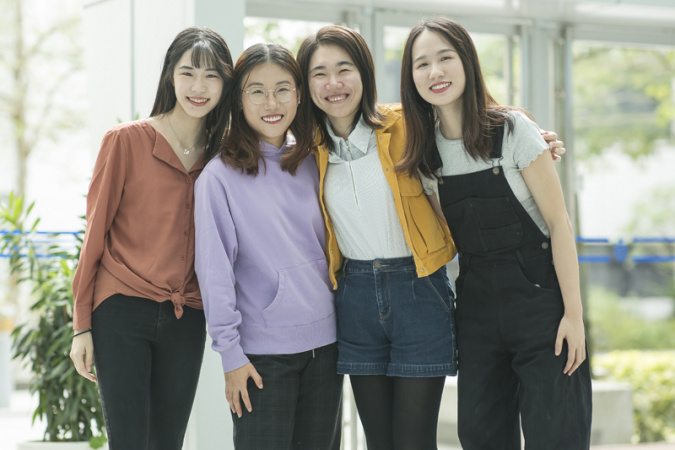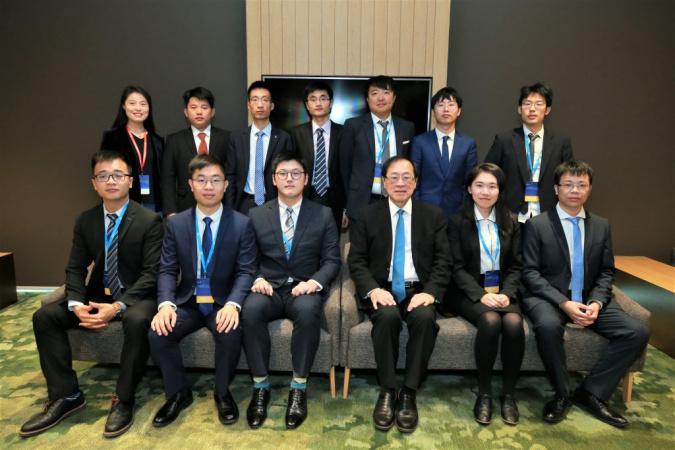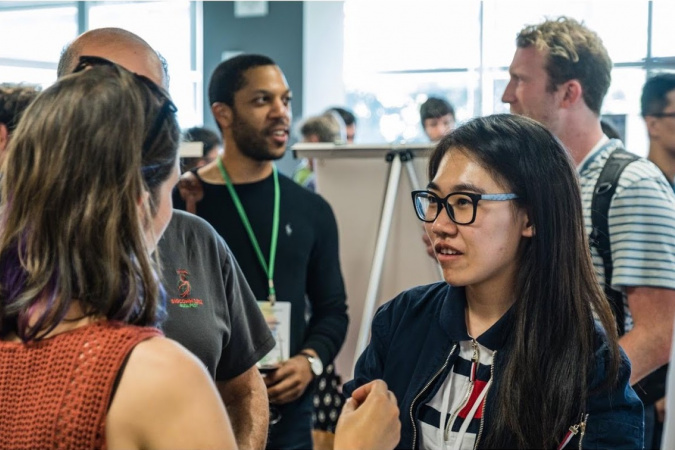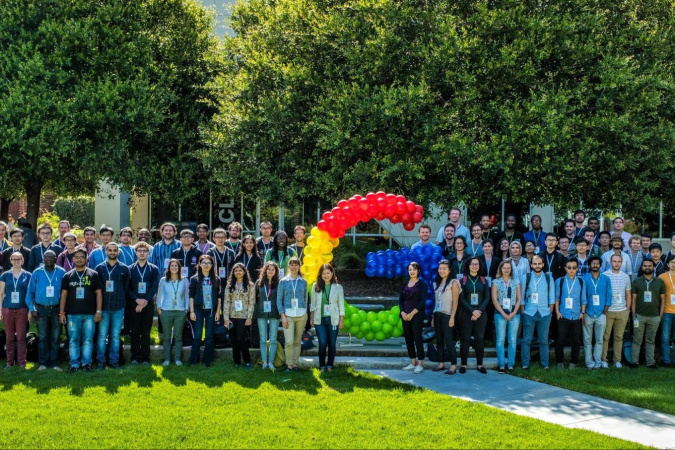Leveraging Computer Science to Turn Imagination into Reality
- PhD student in Computer Science and Engineering (Class of 2020), HKUST; BSc in Computer Science (Class of 2015), Nanjing University
- 2018 Google PhD Fellow in mobile computing, one of the only six fellows from universities in East Asia among the 57 recipients in this global program in 2018
- 2018 Microsoft Research Asia Fellow, the only female among the 11 fellows, chosen from 100+ nominated PhD candidates in the Asia-Pacific region
Video game enthusiast Wei Lili has turned her childhood interest into cutting-edge research that sets to produce reliable high-quality software for mobile phone users.
1. What do you find fascinating about computer science?
I think my interest in computer science starts from my enthusiasm in playing all kinds of video games when I was a kid. I particularly like those role-playing games with interesting stories. When I was young, I had various imaginations of adventure stories in my mind and thought it would be fantastic if I can make my stories into real games. I think computer science techniques are a medium to turn my imagination into reality in the digital world. This is the original motivation for me to choose computer science as my major.
2. Why do you choose HKUST to further your studies?
When I was in high school in my hometown Shenzhen, I attended an orientation of HKUST given by our high school alumni, who were HKUST students. I was impressed by their sharing on the campus life and beautiful views of the university. HKUST became my dream school since then. In addition, HKUST is a renowned research-oriented university. So I applied for the PhD program in the Department of Computer Science and Engineering after I finished my undergraduate study in Nanjing University and fortunately got an offer.
3. What do you like about studying at HKUST?
I am having a great time in our research group. My supervisor, Prof. Cheung Shing-Chi, is very passionate about research. I can feel his excitement when he talks about research problems and his ideas. Prof. Cheung is also a very caring and supportive supervisor. On the one hand, he gives us freedom to choose our interested research topics and to conduct research work at our own pace. On the other hand, he consistently gives us valuable advice on both general research methodologies and detailed solutions to the specific research obstacles. Peers in my group are also very enthusiastic about research. I learned a lot of hands-on strategies on how to conduct research studies from discussions with them.
4. What research are you working on in your PhD?
My primary research area is in software engineering. We aim to help software engineers to produce reliable high-quality software. In my PhD study, I work on fragmentation-induced compatibility issues in Android apps. Android is a popular open-source mobile operating system. Many smartphone manufacturers (Samsung, Huawei, etc.) choose to build their device models based on Android. However, the manufacturers will customize the Android system to meet their own needs. This results in many different Android versions (Samsung Android, Huawei Android, etc.). The problem is that these different Android versions can behave differently. An Android app can thus behave inconsistently on different Android device models. For example, an app which works properly on Samsung devices may crash on Huawei devices. This is what we call “fragmentation-induced compatibility issues”. This has created great challenges in Android app development as it is very difficult for developers to identify such issues given the huge number of available Android device models. In my PhD study, I have conducted studies to characterize such compatibility issues and developed tools to automatically detect them in Android apps. Our tools have already detected 185 such issues in different Android apps and 89 of them have already been fixed.
5. Can you share with us your learning experience in the Google PhD Fellowship Program and Microsoft Research Asia Fellowship Program?
The two fellowships offer different valuable opportunities and resources to help us pursue research. They are highly competitive, so I feel extremely fortunate and much encouraged to be selected for both of them. I view them as recognitions of my research accomplishments.
Google offers a one-year mentorship program. I had a mentor from Google Research and we had quarterly meetings discussing my research projects. He gave me many interesting ideas from his perspective as a researcher and engineer at Google. Google also invites the PhD fellows to an annual summit. I attended the summit in 2019 summer in Google’s main campus in the US. It was a great experience as Google researchers from various areas shared their latest studies and findings with us. We also had chances to give poster presentations and lightning talks to introduce our research projects. I was very glad to have the chance to exchange ideas with all the bright minds I met in the summit. Also, I met the fellowship review committee chair for my area in the summit. I was much encouraged to hear from him that he had a strong impression on my proposal and found my proposed technique very useful.
Microsoft Research Asia (MSRA) invites the PhD fellows to their annual conference, “Computing in the 21st Century Conference”. I attended the conference in 2018, which was also the ceremony for the 20th anniversary of MSRA. The conference invited many famous computer scientists from all over the globe and enabled us to have a treasured experience to meet with several Turing Award winners including Prof. Andrew Yao, Prof. Raj Reddy and Prof. Yoshua Bengio. All of them shared their advice for young computer science researchers. In addition, the program also offers a three-month internship. I am looking forward to spending some time as an intern at MSRA.
6. What is your career aspiration?
I would like to find a faculty position after I graduate. I enjoy doing research in software engineering and I wish that I can share my enthusiasm with my future students.
7. As a female student, how do you see the gender balance at SENG?
I think male students still account for a large number in SENG. In fact, I was the only female student in our research group (among 6 to 8 students) for four years. I think one of the reasons for such gap is that people have stereotypes on engineering students: engineering is a male’s game and engineering students are nerdy. But from my experience and observation, these are not true. I know a lot of female rock stars in engineering who maintain good balance between their career and life. I believe everyone – no matter male or female – can succeed in engineering if you have the passion and ability.
I am glad that the gender balance is improving with more and more female students joining engineering study. In this year, we have three new female members in our group. Now I can have more girls’ time in my lab. J
8. Advice to prospective students who are interested in engineering?
Engineering is fun. It is a discipline of making useful artifacts to improve our life. To be a good engineering student, you do not only need strong backgrounds in science (mathematics, physics, etc.), but more importantly, you should think about human – that is leveraging your science backgrounds to create useful artifacts for human. It is very rewarding when you see that the artifacts you build are well recognized by users.
9. What are the essential qualities that engineering students should possess?
Patience and perseverance. Resolving real-world problems and building practical artifacts require you to deal with every detail. This can be tedious. I think engineering students should be patient and perseverant to tackle these problems.
10. Your tips of success in studying engineering?
Be prepared for difficulties but don’t be afraid of them. There can be a lot of difficulties since engineering students need to face the complexity in the real world. In particular, research postgraduate students focus on cutting-edge problems which are not easy to resolve. However, be brave to face the difficulties and seek for resolutions. You will find they may not be as challenging as you imagined.
Related links:





